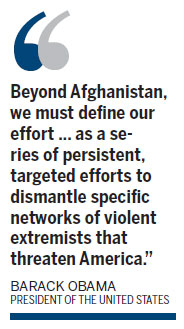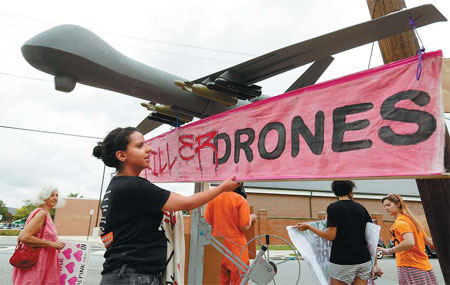Obama seeks end to constant 'war on terror'
|
Demonstrators outside the gates of Fort McNair, where US President Barack Obama spoke at the National Defense University in Washington on Thursday. Kevin Lamarque / Reuters |

Twelve years after the "war on terror" began, US President Barack Obama wants to pull the country back from some of the most controversial aspects of its global fight against Islamist militants.
In a policy speech on Thursday, Obama narrowed the scope of the targeted-killing drone campaign against al-Qaida and its allies and took steps toward closing the Guantanamo Bay military prison in Cuba.
He acknowledged the past use of "torture" in US interrogations; expressed remorse over civilian casualties from drone strikes; and said that the Guantanamo detention facility "has become a symbol around the world for an America that flouts the rule of law".
After launching costly wars in Iraq and Afghanistan, the United States is tiring of conflict. While combating terrorism is still a high priority for the White House, polls show by large margins that Americans' main concerns are the economy and domestic concerns such as healthcare.
"We have now been at war for well over a decade," Obama said near the start of his address. Toward the end, he added, "But this war, like all wars, must end."
Faced with criticism about civilian casualties in attacks by unmanned aerial vehicles, Obama said the United States would only use those drone strikes when a threat was "continuing and imminent", a nuanced change from the previous policy of launching strikes against a significant threat.
Under new presidential guidance signed by Obama this week, the US Defense Department will also take over some lethal drone operations from the CIA.
That would subject drone attacks to more scrutiny from Congress and might lead to the Pentagon taking over drone operations in Yemen, but not in Pakistan, where the CIA is likely to continue to run the program.
With al-Qaida leader Osama bin Laden killed in a US raid in 2011, a number of the group's top members taken out in drone strikes, and the US military role in Afghanistan winding down, Obama made clear it was time for a policy shift.
"Beyond Afghanistan, we must define our effort not as a boundless 'global war on terror', but rather as a series of persistent, targeted efforts to dismantle specific networks of violent extremists that threaten America," Obama said.
Human rights groups mostly welcomed Obama's assertion that America could not remain on "a perpetual war-time footing", but some activists said he was not going far enough.
Republican opponents warned against being too quick to declare al-Qaida a spent force.
"The President is correct to highlight the successes in America's war on terror that have occurred since September 11, 2001," said Senator Marco Rubio, a Florida Republican mentioned as a possible US presidential candidate in 2016.
"He is wrong, however, to understate the continued threat to the US homeland or to suggest that the lethality of the threats posed by a weakened al-Qaida and its affiliates is a return to a pre-9/11 norm that Americans should just accept," Rubio said in a statement.
The new US drone rules are likely to reduce "signature" drone strikes, in which the United States targets what appear to be suspicious-looking groups of people. Those attacks are blamed for many civilian casualties in Pakistan and Yemen.
Obama "has clearly raised the bar significantly for the use of drone strikes with the very specific and restrictive criteria," said John Bellinger, former State Department legal adviser in former president George W. Bush's administration.
"The standard for targeting is now the same for Americans and non-Americans - it must be a continuing and imminent threat of violence to Americans. And there must be a near certainty that no non-combatants will be killed," he said.
The New America Foundation's widely cited drone attack database shows there have been 355 drone strikes in Pakistan since 2004 and more than 60 in Yemen since 2009.
(China Daily 05/25/2013 page8)









